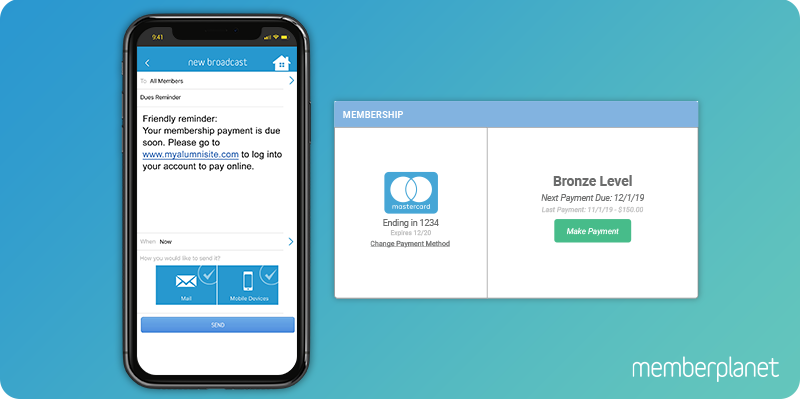|
Alumni chapters and associations help maintain a vital connection between graduates, undergraduate members, and the university. It’s how those lifelong relationships are tended to and grown; they’re where opportunities can come from. However, if your daily tasks as an alumni chapter leader involve chasing down individuals for payments, searching through spreadsheets to check off who’s paid in a seemingly endless circle, it’s time for a dues program.
The world itself is nearly automated, and your alumni chapter should be the same. Committing to and selecting the right dues program should be easy – features are built in and turnkey, allowing alumni leaders to get started on Day 1. No longer having to do everything manually does more than save time and frustration, it allows you to focus on more vital goals of your alumni chapter, such as leadership and philanthropy. Check out these key benefits.
Integrated payments technology
A comprehensive dues program is much more than just money collection because it utilizes an integrated payments solution that ties together your online payment processing, your membership data, and administrative tasks – to get them working autonomously and in sync. This creates a more enhanced membership experience including a frictionless join and renewal process, which are critical to the year-over-year success of your alumni association. A major benefit is flexible collection periods. Alumni chapter leaders can select how often they collect dues online based on what works best for their chapter. Your chapter may prefer an annual collection, or your alumni association might require you to collect dues monthly; either way, you have the option to choose the frequency that best suits your chapter. Members benefit from the convenience of paying dues based on their join date. You no longer have rigid limitations of enrolling new members on a specific date, and a dues program can automatically send email reminders and bill everyone on schedule. Staying organized is a given. Administrative users can easily see which of their members have paid, check payment schedules, and identify those who are past due. Since membership data is synced and admin tasks can be automated, members who have missed the grace period for making a dues payment can be automatically made inactive or unable to receive member benefits. A modern and frictionless membership experience A dues program that really works will aid in the success of your alumni chapter. At every turn it provides options to help you grow, help you automate dues collection, and help you save time. Setting up multiple tiers of membership and varying prices is a standard feature. For example, leaders can offer a discounted rate for new graduates, as well as different prices for membership levels. Robust functionality makes it easier for you to manage membership, and in turn, allows you to offer flexibility and more options to attract new members. We have all grown accustomed to the convenience of subscription services in our everyday lives. Almost everything we pay for (Amazon, Netflix, cell phone, etc.) has an auto-pay option. Your alumni chapter should be one of them! The success of your alumni chapter increases greatly when the membership renewal experience is frictionless. A dues program allows you to offer auto-pay solutions, such as recurring payments and online payment options. Administrators can also expect to customize automated payment reminders with messaging and branding. As with any professional subscription service, a comprehensive dues program puts members in control of their own accounts with self-service tools. Members can set and forget payments with a credit card or choose to securely make payments directly from their bank account. They can also view their payment history, see scheduled payments, manage payment methods, or pay early. One of the less discussed but equally vital benefits of a dues management program is a credit card account updater service. This automatically prevents payment interruptions and minimizes declines, because the service updates your members’ card information on file. This helps maintain continuity of payments by staying on top of credit card changes due to card expirations and other occurrences.
Improved marketing
The technology of a dues program has positive effects on marketing – something alumni chapter leaders should take advantage of. Alumni chapters can place a link for members to sign in and complete payment on their website, social media, or anywhere else. More advanced programs simplify dues collection with multi-channel communication and feature-rich marketing tools. Alumni leaders can get the word out on multiple channels using email campaigns and group text messages; targeted distribution lists allow you to reach everyone on a particular membership level with one mass email that can be personalized for each member. The fact that the tools are integrated with membership allows admins to further segment and target members based on platform data. Integrated marketing tools should help leaders appeal to prospects as well in effectively communicating the value of joining the alumni association. A dues program’s broader benefits include bolstering engagement opportunities and philanthropic support for the university. Our solution Simplifying dues and membership is memberplanet’s specialty. While alumni chapter leaders have many dues programs to choose from, our integrated payments technology offers a more customized, automated, and seamless experience for every level of your fraternal organization. Our technology works behind the scenes, so all communications and even the member portal can be tailored to adopt your organization’s branding. Members see your message and brand front and center – not a third-party payment processor, which may come across as unprofessional. For more information on memberplanet’s dues program, please schedule a demo with the team. About Matt ArnoldAs our Vice President of Business Development, Matt is dedicated to serving member-based organizations and small to mid-sized associations. With over 10 years of experience wearing various leadership hats as an Alpha Tau Omega alumnus, Matt specializes in all fraternal organization matters. Whether a group is challenged with growing membership or struggling to engage members, he's got a solution.
0 Comments
memberplanet will be exhibiting its membership management software and fundraising solutions at the North American Interfraternity Conference (NIC) Annual Meeting of Members and Foundation for Fraternal Excellence's (FFE) Seminar, Aug. 11-14, 2019, in Indianapolis, IN.
Why Fraternal Foundations and Organizations Choose memberplanet:
We solve challenges for the fraternal community and empower them to manage members, engage supporters, and grow membership. Our 30+ national partnerships help us provide dynamic solutions for fraternal foundations and organizations: The Hub – provide a home for your members with easy-to-maintain, memberplanet-powered websites. The Hub maintains brand integrity across chapter templates, and members can log in to access self-service tools. Funds Multiplier – reach more people and raise more funds for any type of campaign. Fundraising and event microsite templates are easy to customize and promote with feature-rich marketing tools. Alumni Access – the platform provides both chapter and alumni leaders with the tools they need to grow membership. Promote networking, fundraising and events, and simplify dues collection to keep members active even after graduation. Fraternal leaders at headquarters can conveniently manage chapters, maintain brand consistency, gain financial transparency, and empower chapter and alumni leaders for success, all from the same platform. Visit the memberplanet booth or schedule a call with our team to learn how the platform can help your organization succeed.
memberplanet is exhibiting our association management software (AMS) at the 2019 ASAE Annual Meeting & Exposition August 10 - 13 in Columbus, Ohio!
Why associations choose memberplanet: Manage, engage, and grow your association with memberplanet’s powerful AMS. Track activity, view reporting, gain high-level organizational visibility – all in one spot – so your staff can spend less time on admin tasks and more time growing your association and driving value.
Save time and resources, increase productivity, and maintain brand integrity. Gain visibility over you entire organization with an integrated, cloud-based AMS!
Come to Booth #1550 to learn more!
We’re proud to exhibit our association management software at the 2019 ASAE: Marketing, Membership, & Communications Conference (MMCC) June 6 - 7 in Washington, D.C.! Why associations choose memberplanet: All tools on the platform are fully integrated to give association leaders high-level organizational visibility, greater financial transparency, and a seamless user experience with technology partners via API integration.
Come to Booth #710 to learn more! See you in D.C.!
memberplanet is exhibiting our membership management software at the 2019 FEA Annual Meeting, May 29 - May 31, at the Mandalay Bay Resort in Las Vegas. What Your Fraternal Community Can Do With memberplanet
Come to Booth #219 to learn more! See you in Las Vegas!
The days of cash carrying are over. Unless you’ve been living under a rock for the last couple decades, you’ve noticed the societal shift toward electronic payments. What does this mean for you and your PTA? Let’s get schooled on payment methods. The reality is that ignoring this trend can seriously hurt the future growth of your local PTA. The benefits are enough to outweigh whatever costs are incurred – and we have proof. Check out these five payoffs of accepting electronic payments. 1. Grow your membership Studies indicate more than 70 percent of Americans have at least one credit card. Even more compelling is that 60 percent of consumers pay with credit cards instead of cash. This means that accepting credit card payments increases your ability to attract potential PTA members who find electronic payments more convenient. You can connect with a larger audience to recruit members, reach more donors for your campaigns, and increase ticket sales for your events. It’s simple math – when you broaden your reach, you also increase your chances of boosting membership. 2. Increase school and PTA revenue Research shows that people are willing to spend more on their credit cards than when making cash purchases. This has obvious benefits for fundraising campaigns, as it can lead to bigger donations from individuals. The New York Times sites several studies that demonstrate the increase in spending with credit versus cash of at least 5-10 percent. In one study, graduate students paid nearly double the price for a sporting event ticket when paying with a credit card! 3. Ease the burden of holding on to large sums of cash and checks PTA leaders don’t need to be carrying members’ cash and check payments with them. By accepting electronic payments, you make it more convenient for your members to pay by their own method of preference, and you’re likely to save yourself a trip to the bank. Direct deposit also removes the inconvenience of paying out of pocket. Accepting electronic payments increases cash flow by limiting the time it takes for money to appear in your account. Instead of waiting for PTA members or donors to mail a check, then depositing the check, and waiting for it to clear, funds are deposited directly into your account. 4. Simplify recurring payments and donations Local PTA members and donors can set up recurring membership payments and donations. memberplanet’s electronic payment feature is built in, easy to use, and features advanced encryption to ensure payments are securely processed and deposited directly into your designated account. Simplifying the payment process makes it easier to collect membership dues and retain current members, and is beneficial when collecting donations during fundraisers. 5. Build credibility with credit cards Accepting credit cards is particularly helpful because it adds credibility to a PTA’s operation. When your members and potential members see that you’re accepting credit cards it increases the legitimacy of your local PTA. Furthermore, limiting your PTA to cash transactions can seem unprofessional given the rise of electronic payment options. Accepting electronic payments facilitates the exchange of money for you and anyone you collect payments from. This is beneficial and convenient for collecting membership fees, receiving donations, and selling event tickets or any other PTA product or service your offer. With an evident shift from cash to credit, it is essential to offer a variety of payment methods to retain members, grow your organization, and maximize PTA contributions. Ready to get started? Log in to memberplanet and set up your account to collect electronic payments. PTA Simplified is a series of tips for PTA and PTO leaders to get the most out of a powerful association management system – to manage, engage, and grow their membership all year long. Updated since original publication on 7/01/2017.
We live in a world of instant communication. With a few clicks, almost anyone in the world can be reached via phone, email, or text messaging. Communication being this instantaneous has amazing benefits, but it can be confusing at times to choose the best method for your message. Emails are great for long form announcements, and they are typically a groups bread and butter for communication. But there are times when a text message is a better method to communicate with your members. Take a look at our three rules of when to text your members instead of email. Trust us, you’ll be glad you did. Text your members when… 1. You have urgent announcements/reminders Shooting your members reminder messages is great for PTA leaders on the go. For example, a perfect time to send a reminder a text message is before an event. Shoot a quick text to remind admins to bring the decorations, or to pick up tape because you’ve run out. Messages are also great for reaching members quickly when breaking news happens in your PTA. 2. Your message is short and sweet Text messages are great for instant contact with PTA admins and members, but be mindful of sending too many texts. If members feel like they are constantly being sent messages, they may become less responsive and engaged. Save text messaging for important announcements or reminders. Non-time sensitive items are best left for email or meetings. 3. You need a response – pronto! When you are looking for a quick turnaround on responses, text messaging is the way to go. Let’s face it, our phones are never far out of reach. Sending a text message is a great way to ensure members receive messages fast. Our text messaging feature is different from a regular text message – even if you text multiple members, only you will receive their responses (unlike those annoying text chain messages). Make sure to send texts at times that you will be responsive to messages, and set aside time to put your phone down so you and your admins can enjoy time with family. Now that you know the golden rules of when to text members, learn how to create and send a text message. PTA Simplified is a series of tips for PTA and PTO leaders to get the most out of a powerful association management system – to manage, engage, and grow their membership all year long. Updated since original publication on 11/15/2017.
The constant pull of activities, to-do’s, and work for your PTA can leave you and other volunteer leaders with little time to focus on the vital task of boosting membership. On the flip side, parents and those you want to recruit to join your PTA are already time-deficient between their work and their children. These two hurdles however, don’t stand a chance with the memberplanet toolkit at your fingertips. memberplanet is like your friendly neighborhood Spider-Man, here to ensure you’re maximizing your efficiency while attracting more members to your cause – without creating a supervillain amount of work. 1. Make it easy to become a member – offer electronic payment methods The first step to growing is to make it as convenient as possible for new members to join. A best practice for any organization is to make it easy for people to pay for your services. Offering electronic payment methods is the first step toward offering a convenient and modern membership experience, which is what everyone in today’s society has come to expect. Instead of forcing people to pay by cash or check, you’re giving them the option to pay by their preferred payment methods. Learn more: How Collecting Funds Online Benefits Your PTA in 5 Big Ways. memberplanet’s payment process is simple and direct. A few clicks, some basic information, and new members are in. Local PTA leaders can even set up automated email reminders to notify members when it’s renewal time, so it’s not only easy to join, it’s easy to stay a member. Check out our three-step checklist to get started. 2. Use multiple forms of communication to reach potential members To describe the header above, which is quite a mouthful, we frequently use the term multi-channel communication. Simply put, it’s using all different methods, mediums, and platforms (preferably the ones your prospects are using) to get the word out. That way, even if your potential members “change the channel” they’ll still receive your message. You can still distribute paper flyers, send snail mail, and yell through a megaphone to communicate (whatever works, right?), but we recommend also using more cost-effective digital forms of communicating: websites, e-newsletters with tracking, email and group text messaging, and social media. memberplanet's platform is equipped with tools to efficiently and consistently use multi-channel communication, and the best part is you don’t have to use multiple programs. 3. Blast out your benefits Telling recruits what they have to gain by becoming a member of your PTA seems like a no-brainer. It’s surprising though, how that message can get buried under the guise of free incentives. Let’s be honest – offering free food, t-shirts, and other giveaways are great for getting people at the door/sign-up table/website, but when it comes to sealing the deal, there’s no alternative for communicating the true benefits of your PTA – your mission of positively affecting the lives of all children and families. That’s a wonderfully amazing cause, and one that should come across consistently in every explanation of your benefits. Give your prospects the feeling that by joining, they’d be participating in something that’s bigger than themselves – something that makes a difference. You have all kinds of options on memberplanet to optimize your message, from creating customized event sites to utilizing targeted, dynamic distribution lists. PTA Simplified is a series of tips for PTA and PTO leaders to get the most out of a powerful association management system – to manage, engage, and grow their membership all year long. Updated since original publication on 7/01/2017.
Amazon is making a killing with their membership program – and other retailers have discovered they can ride the Prime wave. Since Amazon has raised the price for Prime membership, other companies can successfully do the same. The American Society of Association Executives’ (ASAE) Associations Now blog has given this a catchy name – the Prime effect.)
For the association industry, we can steal a page from Amazon’s playbook – while the membership model is nothing new, the way your association approaches the membership experience constantly needs to be kept top of mind. It really is all about the member experience. Amazon and other service giants, such as Netflix, have learned to cater exclusively to their members through complex algorithms – gone is the “one size fits all” mantra. Woven into the member experience is value. Membership-based organizations need to remember their value proposition, and they must deliver on it. Try not to get too wrapped up in dues payments and donations. Focus on the value your association can offer your members.
Convenience is also key. Your association may drive value, provide the best and most comprehensive solutions and benefits – but are they easy to access? Are your members spending too much time on painstaking tasks that provide no value to them? Do your members have a clear picture of the benefits you provide? Amazon and Netflix have seen sustained success not only because of their innovation, but because their services are easy and fast to utilize. Customers know exactly the benefits of being a member, and it’s easy to access those benefits and manage their own accounts at a time when it’s most convenient for them. Something that we must also consider – which is outside the scope of Amazon and Netflix services – is the impact your association has on constituents. More often than not, the value of an association goes beyond transactional services. Associations provide education, advocacy, community, and more to their members – but it doesn’t stop there. Those members in turn provide value to their industries, constituents, and societies to which they belong. If you want your association to experience longevity, embrace your role in providing value that goes beyond membership.
During the holiday season, everyone is bombarded with fundraising campaigns. You’ve likely taken advantage of giving season yourself, and that’s not a bad thing. To switch things up, consider also offering your members a way to give their time, and not just their money. In November, you’ve got Thanksgiving, Black Friday, Small Business Saturday, Cyber Monday, and Giving Tuesday – one right after the other. To help you out during this especially busy time for your members, we have some tips to encourage volunteering. Yes, really! Set up an incentive Members are lot more likely to volunteer their precious time if there is a return on investment for them. Try offering an incentive that will help give members that little extra push to sign up. The incentive can be simple; for example, first dibs on fundraising booth shifts, one extra vote in a t-shirt design survey, or even a gift card. The point is, no matter the occasion these small enticements can lead to a big turnout on participation. Plan and communicate early Procrastination is the enemy. If you’re collaborating with a local nonprofit, have a plan in place as early as possible. Communicate clear expectations to everyone involved, including your members. Create a frictionless experience to volunteer by sending out a form with easy-to-select sign-up dates and times, so it is effortless for members to contribute their time. Once someone signs up, have an automatic confirmation email set up to include all the information they’ll need for the event. Sometimes, plans don’t pan out – and we recommend having a back-up plan if a couple volunteers need to back out. By putting in a little effort ahead of time to connect with all parties involved, you will likely see more willing, and might we add happy, volunteers. Make your cause hit home In addition to competing with busy schedules, there are countless wonderful causes and charities your group is up against. The more that you can personalize your cause to your potential volunteers’ interests, the more successful you’ll be in getting them to commit. Try to volunteer for causes that are local, or causes that directly affect your group – and communicate the benefits of their time. Members are more likely to be encouraged to help a cause they are passionate about, and one they know makes a difference. Updated & refreshed from its original publication on 11/17/17
|






















